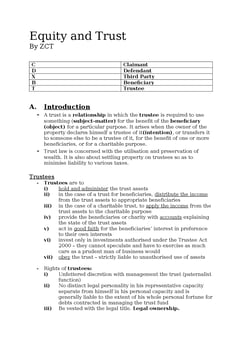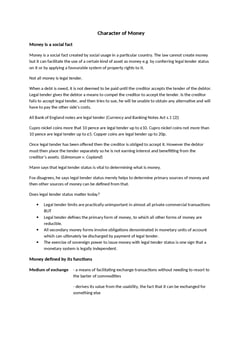Re Goldcorp Exchange Ltd [1995] 1 AC 74
Judgement for the case Re Goldcorp Exchange Ltd
Table Of Contents
KEY POINTS
The Sale of Goods Act 1908 in New Zealand triggered a legal quandary involving customers who had purchased bullion unallocated. The central question was whether these customers had acquired a proprietary interest in the bullion, per Section 18 of the Act.
Allegations of the company breaching a promise to segregate bullion stocks further complicated matters, raising issues about property passing to non-allocated claimants and the acquisition of newly purchased bullion.
Simultaneously, the principle of estoppel came into play, focusing on whether the company, having represented customer title to the bullion, could be estopped from denying it. The complexity deepened as the inquiry explored the binding nature of estoppel on a debenture holder.
The examination extended to trusts, particularly constructive trusts. Accusations of the company misappropriating purchasers' bullion led to questions about whether the purchasers had an equitable lien over the company's assets. This inquiry aimed to establish the extent of the purchasers' tracing remedies within the framework of a constructive trust.
FACTS
Goldcorp Exchange Ltd. (in Receivership) sold unascertained bullion to non-allocated claimants, failing to maintain promised separate stocks. The second Respondent initially bought specific gold coins but later acquired 1,000 maples non-allocated. The company, facing financial difficulties, mixed W. Ltd.'s properly ascertained bullion with its own. The Bank of New Zealand appointed Receivers, crystallizing its floating charge.
In the High Court, non-allocated Claimants and the second Respondent's proprietary claims were rejected, while the company's lowest bullion balance limited W. Ltd. Claimants' claims.
The Court of Appeal overturned this, granting non-allocated claimants and the second Respondent a beneficial interest in purchasing money traceable into the company's assets, prioritized over the bank's charge.
-
The case was appealed to the Judicial Committee, where the appeal succeeded on the grounds of absence of specific bullion property, lack of estoppel, and non-allocated Claimants' absence of proprietary interest.
W. Ltd. Claimants were not part of the appeal but aligned with the Court of Appeal's decision.
JUDGEMENT
-
The appeal was allowed for the following reasons:
Non-allocated Claimants and the second respondent did not gain immediate legal or equitable bullion property upon purchasing unascertained generic goods. Collateral promises by the company did not create trust, and no immediate transfer of title occurred regarding the company's current bullion stock.
The company, despite representing customer title to bullion, was not estopped from denying it due to the absence of a fixed and identified bulk. Any estoppel did not bind the bank, maintaining a proprietary interest unaffected by prior dealings upon the crystallization of its charge.
Non-allocated Claimants and the second respondent lacked proprietary interest in bullion acquired after their contracts, as it was impossible to identify the relevant acquisition. Collateral promises did not establish a trust, and the company, without a separate stock, was not under fiduciary obligations. No remedial constructive trust or restitutionary proprietary interest was declared over the company's remaining bullion.
Purchase money was not initially impressed with a trust, and the company, not acting wrongfully, was not obliged to set aside purchased bullion for unallocated sale contracts. Customers, having paid, were not entitled to a remedial constructive trust or restitutionary proprietary interest in the company's bullion.
Customers, not rescinding contracts, could not claim ineffectuality due to misrepresentation, mistake, or total failure of consideration. Reliance on the company's promises did not grant them a proprietary right superior to the bank's interest. Equity did not intervene for a remedial restitutionary right over the bank's charge.
The W. Ltd. Claimants were entitled to remedies granted by the judge, and the order restoring their entitlement was upheld.
COMMENTARY
Goldcorp Exchange Ltd. sold unascertained bullion to non-allocated claimants, failing to maintain separate stocks as promised. The High Court rejected claims for proprietary interests by non-allocated Claimants and a second respondent. W. Ltd. Claimants initially succeeded, but the Court of Appeal granted non-allocated Claimants and the second Respondent a beneficial interest in purchasing money traceable into the company's assets.
The Judicial Committee's appeal succeeded due to the absence of immediate bullion property, lack of estoppel, and non-allocated claimants' lack of proprietary interest.
W. Ltd. Claimants were entitled to remedies granted by the judge, upheld in the final order.
ORIGINAL ANALYSIS
(NB PRIVY COUNCIL DECISION ON A NZ CASE)
Plaintiffs agreed with Defendant to buy a certain quantity of bullion that would be stored with Defendant and that Plaintiffs could order it to be delivered on 7 days notice. However Defendant failed to store enough bullion to meet all the customers’ demands.
Plaintiffs claimed that Defendant had held it on trust for them, so as to get ahead of secured creditor banks in the queue to have their money returned upon Defendant’s bankruptcy.
PC rejected this argument on the same basis as Re London Wine: that the bullion of each individual customer was not kept separate for him but was kept with the general supply, and thus the arrangement did not reach the required level of certainty of subject matter.
It rejected the idea of introducing a remedial constructive trust.
Lord Mustill
There would be no way of telling when the proprietary interest arose if imposed retroactively.
For Further Study on Re Goldcorp Exchange Ltd

Equity notes fully updated for recent exams at Oxford and Cambridge. Th...
Need instant answers? Our AI exam tutor is here to help.
Ask questions 🙋 Get answers 📔 It's simple 👁️👄👁️
Our AI is educated by the highest scoring students across all subjects and schools. Join hundreds of your peers today.
Get StartedSimilar Cases
Related Product Samples
These product samples contain the same concepts we cover in this case.
| Personal Property Law | Destruction Of Property Rights Notes (24 pages) |
| Trusts and Equity | Trust Remedies Including Tracing Knowing Receipt Trust Dutiies And Powers And Equitable Damages Notes (60 pages) |

 Since 2010, Oxbridge Notes has been a trusted education marketplace, supplying high-quality materials from top achievers at universities like Oxford, Cambridge, LSE, Harvard, and Yale.
Since 2010, Oxbridge Notes has been a trusted education marketplace, supplying high-quality materials from top achievers at universities like Oxford, Cambridge, LSE, Harvard, and Yale.